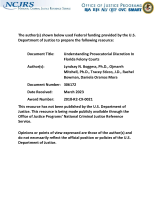Criminal codes
Criminal Crews, Codes, and Contexts: Differences and Similarities across the Code of the Street, Convict Code, Street Gangs, and Prison Gangs
Understanding Prosecutorial Discretion In Florida Felony Courts
Gangs, Terrorism, and Radicalization
Third Parties: Victims and the Criminal Justice System
Special National Workshop - State Legislative Strategies for Correctional Reform - Workshop Proceeding - Criminal Justice Research Utilization Program, May 19-20, 1980
Minnesota Police Department Finds Ways to Embrace Technology
How Collaboration Between Researchers and Police Chiefs Can Improve the Quality of Sexual Assault Investigations: A Look at Los Angeles
Panelists discuss the application of research findings from an NIJ-sponsored study of sexual assault attrition to police practice in Los Angeles. There are three main focal points: (1) the mutual benefits of researcher/practitioner partnerships, (2) the implications of variation in police interpretation of UCR guidelines specific to clearing sexual assault (with an emphasis on cases involving nonstrangers), and (3) the content of specialized training that must be required for patrol officers and detectives who respond to and investigate sex crimes.
See the YouTube Terms of Service and Google Privacy Policy
Interview with Turkish Judge Altuntas on Human Trafficking
Interview with Turkish Judge Ilknur Altuntas
"Getting Ready Program": Remaking Prison Life to Prepare Inmates for Reentry
Interview with Dora Schriro, Arizona Department of Corrections
International Trends in Fighting Child Pornography
This NIJ Conference Panel brings together American and European practitioners using innovative approaches to thwart the sharing of child pornography online. The panel will highlight two efforts. The first, which NIJ's International Center is evaluating, is a European multilateral project that teams criminal investigators with international nongovernmental organizations and Internet service providers (ISPs) to block access to child pornography sites. The second effort seeks to prevent child pornographers from accessing credit card and other online payment systems.



